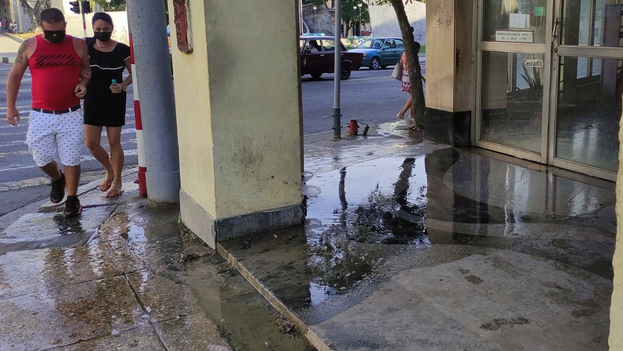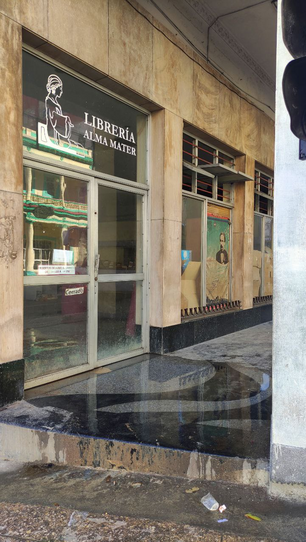
![]() 14ymedio, Juan Diego Rodríguez, Havana, 25 January 2021– A woman with a baby in her arms steps down from the doorway and heads down the sidewalk on tiptoes at the corner of Infanta and San Lázaro in Havana. Without taking her eyes off the ground, the young woman tries to avoid the filth of the sewage waters that have flowed from the interior of the Alma Mater bookstore, which has been closed to the public for weeks because of the foul flood.
14ymedio, Juan Diego Rodríguez, Havana, 25 January 2021– A woman with a baby in her arms steps down from the doorway and heads down the sidewalk on tiptoes at the corner of Infanta and San Lázaro in Havana. Without taking her eyes off the ground, the young woman tries to avoid the filth of the sewage waters that have flowed from the interior of the Alma Mater bookstore, which has been closed to the public for weeks because of the foul flood.
The bookstore offers a selection focused on university bibliography, history, philosophy and sociology manuals, while from the building a dark liquid flows out through the door and reaches the beautiful granite paving, with wavy figures, in front of its entrance. Passersby hurry their steps and tighten their masks as they pass.
The scene is not new. The bookstore has suffered several closures over the years due to the deterioration in the drainage system of the apartment building where it is located. The last repair was completed in October last year, but a few months after its reopening, the premises had to close again.
“You can’t stand here because of the bad smells,” complains a customer of the post office — located several meters from the bookstore – whose line traditionally ran along the covered sidewalk but had to move because of the stench. “You take all this infection home,” laments another customer from a nearby office who has come to buy some stamps.
A “closed” sign can be read on the door of Alma Mater, although its old opening hours are still written above it: Monday to Friday and part-time on Saturdays. In the stained-glass windows, dirty and covered with pieces of brown paper, is a faded poster with the face of José Martí, who curiously has his gaze directed just towards the most flooded area of the portal.
From outside you can hear the sound of sewage dripping into the premises. The leak has destroyed most of the false ceiling and pieces of it are on the ground. However, the bookstore’s Facebook page does not mention its current status, showing only past images from its collection, where books on Fidel Castro and Ernesto Guevara abound.

A local employee tells 14ymedio that the warehouse located in the basement is flooded. “Efforts have been made by the workers to get that water out of there, but they have been unsuccessful so far,” laments the worker. “I don’t understand why they don’t come with an engine to extract it, the situation can turn into a serious health problem.”
The residents of the building are desperate. The bad smell is spreading throughout the area and they feel like they are living a “cyclical curse,” with similar breaks from time to time. At the beginning of last year, a neighbor tried to solve a blockage in his apartment by putting a metal bar through the pipes and ended up causing a break that also forced the bookstore to be evacuated. The current break is attributed to the poor condition of the infrastructure and the lack of maintenance of the property, but one never knows in a block with dozens of residents.
Where the battered bookstore is located today was once the famous Quesada Lamps store, a symbol of Havana from the middle of the last century, where appliances and other home decor were offered. The firm had subsidiaries in several Latin American countries and was nationalized after the Revolutionary Triumph.
But beyond its commercial life, the location of this corner made it one of the emblematic points of the Cuban capital, surrounded by businesses and food service options, on the border between the glamorous neighborhood of El Vedado and the popular and bustling Centro Habana. Even the most famous vagabond in Cuban history, the Knight of Paris, frequented the portal that today has become impassable from the plague.
After a long time of neglect, in 2013 the Alma Mater cultural center was inaugurated on the premises, which had an intranet navigation room on the mezzanine and a small room for events and conferences. In its early days, interesting volumes could be found on the bookstore floor, but as time passed ideological excesses and political pamphlets littered its shelves.
The decadence continued its course and the trade began to sell poorly produced handicrafts and clothes with official slogans. And then, again and again, came the floods. Sometimes it forced them to close for a few days, then weeks that turned into months without service to the public. The wreck of the Alma Mater bookstore has been long and harrowing, and the blame should go not only to the sewage leaks.
____________
COLLABORATE WITH OUR WORK: The 14ymedio team is committed to practicing serious journalism that reflects Cuba’s reality in all its depth. Thank you for joining us on this long journey. We invite you to continue supporting us by becoming a member of 14ymedio now. Together we can continue transforming journalism in Cuba.
